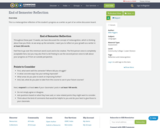
This is a metacognitive reflection of the student's progress as a writer as part of an online discussion board.
- Subject:
- Languages
- Material Type:
- Assessment
- Author:
- Mike Kiggins
- Date Added:
- 07/25/2021

This is a metacognitive reflection of the student's progress as a writer as part of an online discussion board.
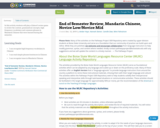
In this activity students will play a Kahoot! review game to review the content, grammatical concepts, high frequency vocabulary and common phrases in Mandarin Chinese that were learned during the semester.
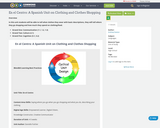
In this unit students will be able to tell what clothes they wear with basic descriptions, they will tell where they go shopping and how much they spend on clothing/food.Strand One: Communication (1.1, 1.2, 1.3)Strand Two: Culture (2.1)Strand Five: Cognition (5.1, 5.2)

Technical Vocabulary practice, focus on new words, listening tasks completion, verb tenses revision.
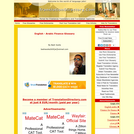
This is a lengthy glossary of highly technical terms focused on finance. Its contents include words dealing with taxes, inheritance, interest rates, retirement plans, and every other aspect of personal finance, as well as many generic legal terms that are also used in the finance world.
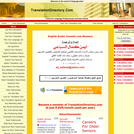
This is a small and extremely specialized glossary containing words that related to the legal status and concerns of minors and juveniles, including such issues as child abuse and the emancipation of minors. Words are translated, but not transliterated.
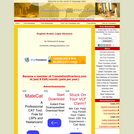
This is an extensive glossary of technical legal terms. Its contents include words dealing with contracts, court terminology, and legal language. The glossary also includes certain economic, real estate and various terms from other disciplines that intersect with the law.

This is a resource for teaching the first half of an English Literature course. The material covers Anglo-Saxon literature through the 18th century, including readings across 1,000 years of literature.This material would be useful for teaching a course that aims to instruct students on how to read, analyze, and write critically about English literature. The resources comprise important terms, readings, and information on how to engage with literary scholarship.
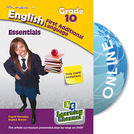
This visual image represents English First Additional Language, a textbook used in schools.
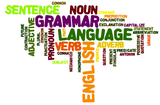
LESSON FOR GRADE 7 ENGLISH LEARNERS
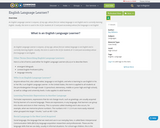
An English Language Learner is anyone, of any age, whose first (or native) language is not English and is currently learning English. Usually, this term is used in the US for students (K-12 and post-secondary) whose first language is not English
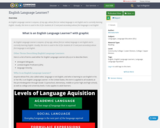
An English Language Learner is anyone, of any age, whose first (or native) language is not English and is currently learning English. Usually, this term is used in the US for students (K-12 and post-secondary) whose first language is not English
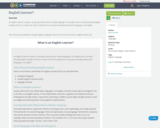
An English Learner is anyone, of any age, whose first (or native) language is not English and is currently learning English. Usually, this term is used in the US for students (K-12 and post-secondary) whose first language is not English. This resource was updated to change English Language Learner to the most recent term, English Learner (EL).
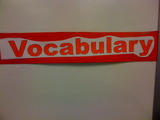
This OER resource was created by Leo Sierra and as part of the 2024 World Language OER Summer work and training. Educators worked with Chrystal Liu, Nick Ziegler and Dorann Avey to create OER Learning Plans and materials. All textual content was created and developted with assistance from Chat GPT 3.5 and the ilustration was generated using Microsoft Copilot. The attached resource is designed for 9 - 12 World Language Arts teachers for Novice-High to Intermediate Low Learners of Spanish. This resource addresses the following NDE World Language Standard(s): NE WL WL 1.2.dIt is expected that this resource will take students 30 - 45 minutes depending on how it is presented.
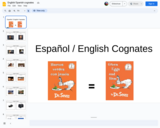
A short PowerPoint on English/Spanish cognates.
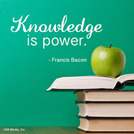
Протягом останніх десятиліть Північноатлантичний Альянс набуває посиленого розширення, зростає активність взаємодії представників збройних сил різних країн в рамках ООН, миротворчих сил та інших міжнародних організацій і структур — все це свідчить про необхідність забезпечення мовної комунікації між учасниками мультинаціональних проектів. Не викликає сумнівів, що чим складніше завдання, які доводиться вирішувати в ході міжнародного співробітництва, тим більш глибокою і якісної повинна бути лінгвістична підготовка військовослужбовців, які беруть участь в їх розв‘язанні, тим більше ґрунтовними мають бути її організація і забезпечення. Враховуючи, що сьогодні міжнародні військові контингенти часто створюються для вирішення раптово виникаючих завдань, і в такому випадку значна частка успіху залежить від уміння відповідного військового відомства тієї чи іншої країни забезпечити цілеспрямовану мовну підготовку своїх представників в найкоротші терміни, між країнами-учасницями «НАТО» було досягнуто згоди про стандартизацію підходу до оцінки рівня знань по двом офіційним мовам НАТО (англійської та французької) (англ. SLP — Standardized Language Profile) — STANAG 6001 (NATO Standardization Agreement). Відповідно до встановлених Стандартом критеріїв глибини й якості знань володіння мовою визначаються по чотирьом аспектам (розуміння на слух, усне мовлення, читання і письмо) та по шести рівням (0-5).
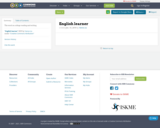
The word on college reading and writing

Students will practice reading, oral and listening skills based on the theme Van Gogh’s Bedroom in Arles, by working with a virtual tour of the painter’s bedroom and by producing their own recordings of podcasts about the virtual tour.
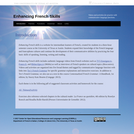
Enhancing French skills is a website for intermediate learners of French. It includes authentic language videos from French websites, as well as interviews of French speakers on cultural topics. Videos and activities are organized into five broad themes and tagged by communicative language function with links into Tex’s French Grammar for specific grammar explanations and interactive exercises. Each theme includes a pdf of suggested classroom activities and homework.

According to ACRL (2016), Information Literacy (IL) is the “set of skills needed to find, retrieve, analyze, and use information.” Myriad of information over the internet was growing and was becoming accessible.Therefore, as teachers we should teach and help students to develop skills and competencies in searching the Web and using information for intellectual and holistic growth to successfully thrive in this digital age.In this lesson we will provide quality web-based resources for students to explore Information Literacy and the salient sub-topics on Plagiarism and Web Searching.The following activities allow students to gain in-depth understanding of our topic. Happy Teaching!